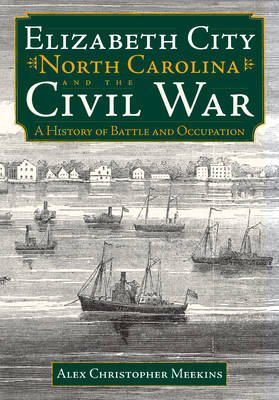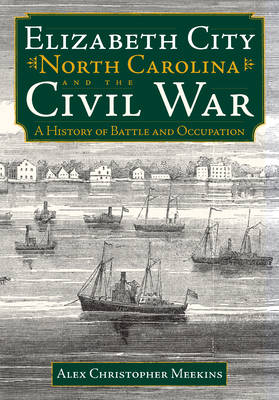
- Afhalen na 1 uur in een winkel met voorraad
- Gratis thuislevering in België vanaf € 30
- Ruim aanbod met 7 miljoen producten
- Afhalen na 1 uur in een winkel met voorraad
- Gratis thuislevering in België vanaf € 30
- Ruim aanbod met 7 miljoen producten
Zoeken
Elizabeth City, North Carolina, and the Civil War:
A History of Battle and Occupation
Alex Christopher Meekins
€ 33,95
+ 67 punten
Omschrijving
It was February of 1862. Although the Civil War was now nearly a year old, the armies had done little more than feint and skirmish. The war at sea, however, was an entirely different proposition. The Union navy's blockade of the Confederate seaboard was ruthless and unremitting.
With no outlets for its agricultural staples and no ability to receive desperately needed European manufactures, the Southern economy was asphyxiating. It was into this backdrop that a Union naval assault force breached North Carolina's coastal defenses to destroy a small squadron of Confederate warships and bombard, capture and occupy Elizabeth City. As author Chris Meekins demonstrates in this engaging account of an oft neglected yet fascinating theatre of the Civil War, the complicated and turbulent history of Elizabeth City during this time only mirrored the overall state of affairs in northeastern North Carolina
With no outlets for its agricultural staples and no ability to receive desperately needed European manufactures, the Southern economy was asphyxiating. It was into this backdrop that a Union naval assault force breached North Carolina's coastal defenses to destroy a small squadron of Confederate warships and bombard, capture and occupy Elizabeth City. As author Chris Meekins demonstrates in this engaging account of an oft neglected yet fascinating theatre of the Civil War, the complicated and turbulent history of Elizabeth City during this time only mirrored the overall state of affairs in northeastern North Carolina
Specificaties
Betrokkenen
- Auteur(s):
- Uitgeverij:
Inhoud
- Aantal bladzijden:
- 160
- Taal:
- Engels
- Reeks:
Eigenschappen
- Productcode (EAN):
- 9781596292123
- Verschijningsdatum:
- 1/11/2007
- Uitvoering:
- Paperback
- Formaat:
- Trade paperback (VS)
- Afmetingen:
- 173 mm x 234 mm
- Gewicht:
- 412 g

Alleen bij Standaard Boekhandel
+ 67 punten op je klantenkaart van Standaard Boekhandel
Beoordelingen
We publiceren alleen reviews die voldoen aan de voorwaarden voor reviews. Bekijk onze voorwaarden voor reviews.











